Методичний посібник "Тексти для формування навичок монологічного мовлення на уроках англійської мови у початкових класах"
Тексти для формування навичок монологічного мовлення на уроках англійської мови у початкових класах
Зміст
My Favourite Raincoat Is Purple
Сьогодні в загальноосвітній середній школі навчанню монологічного мовлення не завжди приділяється достатньо уваги. Така позиція є помилковою, оскільки саме цей аспект навчання дисциплінує мислення, навчає логічно мислити і відповідно будувати своє висловлювання таким чином, щоб довести свої думки до слухача.
Комунікація в усній формі, оволодіння якою є одним з основних завдань навчання іноземної мови в школі з практичною метою, здійснюється за допомогою аудіювання і говоріння. Той, хто передає інформацію іншим, виконує дію говоріння, а усі, хто слухає його, – аудіювання.
Усна комунікація, яка здійснюється при однобічно спрямованому говорінні, коли одна особа виступає з розгорнутим висловлюванням, а інша (частіше, інші) – тільки сприймає його мовлення, то таке усне мовлення набуває монологічної форми.
Одним з основних завдань навчання монологічного мовлення є розвиток навичок усної мови.
Уміння розуміти усну мову та висловлювати нею свої думки є необхідним для багатьох людей
Цей методичний посібник складений на основі лексичного матеріалу підручника English World 2,3 ,MACMILLAN Publishers Limited 2009,Mary Bowen &Liz Hocking, допоможе вчителям англійської мови у проведені уроків розвитку навичок монологічного мовлення.
A Child’s Wish
I want to live
And not to die!
I want to laugh
And not to cry!
I want to feel
The summer sun.
I want to sing
When life is fun.
I want to fly
Into the blue.
I want to swim
As fishes do.
I want to stretch out
Friendly hands
To all the young
Of other lands.
I want to fight
For what is right—
Against disease,
Against despair,
Against stark hunger
Everywhere.
I want to love,
I want to mate,
No atom bomb
Annihilate
My shining world.
I want to laugh
And not to cry!
I want to live
And not to die!
About Myself
My name is … . My surname is … . I am 6. I am a pupil. I am from Ukraine. I live in Brody. I can go, jump, run but I cannot fly. I go to school. I study English at school. I want to be a doctor. I like my school very much.
My Family
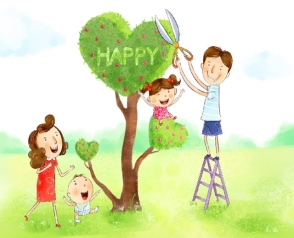
This is my mother. Her name is Oksana.
She is a shop-keeper.
This is my father. His name is Igor.
He is a driver.
This is my sister. Her name is Ira.
She is a student.
I love my family and they love me too.
Fun with your Fingers
This is a father,
kind and dear.
This is a mother,
standing near.
This is my brother,
see how tall.
This is my family
at all.
Animals
This is a monkey. The monkey is a wild animal. It is brown. It is funny. The monkey has got a long tail and a small head. It has got four long legs. It can climb the trees well but it can’t fly.

Monkeys live in the wood.
They eat bananas.
I can see a monkey at the zoo.
I like monkeys very much.
I am not big. I am grey. I live in the yard.
I have four paws and a tail. I can run and jump. My teeth are sharp. I like meat. I say “bow-bow-bow”.
Who am I? ( a dog)
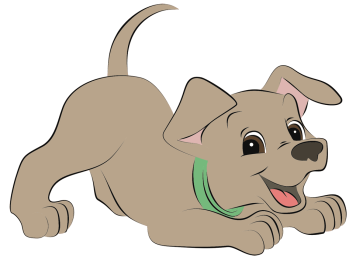
Our School
I study at school №2. My school is big. There is a playground, a canteen on the ground floor. There is a music room , an art room on the first floor. The library is big. It is on the first floor too. The computer room is on the second floor.
We play games in the playground. It is big and nice. In the canteen we eat tasty buns. Pupils sing in the music room. We like to learn and draw in the computer room. We draw in the art room. We read interesting books in the library.
We haven't a swimming pool. It’s a pity.
My school is great. I like my school very much!
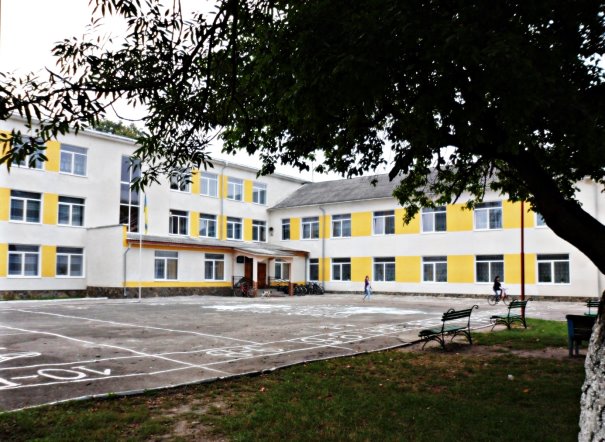
My Classroom
I have a classroom. My classroom is big. It is nice. It is on the first floor. There is a board in my classroom. I can see fifteen green desks here. There are three windows on the left. We have a bin in our classroom. There is a notice board on the right. You can see a cupboard behind me. We have not a TV. There are many flowers in my classroom. You can see many pictures on the walls.
I like my classroom.
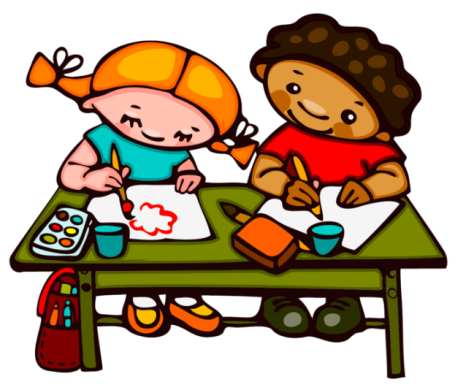
Meals I Like
I am a good eater. I like to eat meat and vegetables. I don’t like rice and eggs. And what about you? I like chocolate ice cream best. For breakfast I want a burger and a glass of orange juice, but I don't want milk. My sister likes chicken legs and chips.
I am hungry now. Can I have a bowl of salad and a piece of toast, please?
Breakfast in the morning,
Dinner in the day,
Tea comes after dinner
Then comes time to play.
Supper in the evening
When the sky is red
Then the day is over
And we go to bed.
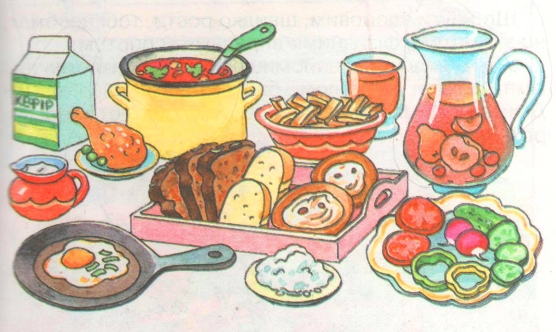
My School Day
I get up at half past seven in the morning. I brush my teeth, wash my face and dress. At eight o’clock I have my breakfast. Then I do my homework. I have my lunch at eleven o’clock and go to school. I have 5 or 6 lessons there. I have my dinner at one o’clock in the afternoon. I like to play with my friends at school.
I come home at five o’clock in the evening. I have my supper at half past six. I like to read books and watch TV in the evening. Then I have a bath. I am tired at night. I go to bed at ten o'clock.
When I go for a walk
I enjoy my games, I talk
With my friends. We often go
To the park. When I come home
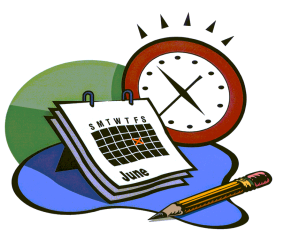
I watch TV and read a book!
I draw a picture—have a look!
I write my letters, play with toys.
They are good for girls and boys.
I help Mum about the house
With my little friend — a mouse.
After that I help my Dad,
Kiss my Mum and go to bed.
Weather And Season
There are four seasons: winter, spring, summer, autumn.
It is winter. Winter is white. The weather is cold in winter. It is snowy. The days are short.
Spring is green. It is wet in spring. It’s rainy. The sky is blue.
Summer is the best season. It is bright. It’s sunny. The weather is hot in summer.
Autumn is a sad season. The weather is bad. It is windy. It’s rainy and wet too. Autumn is yellow. We go to school.
The Seasons
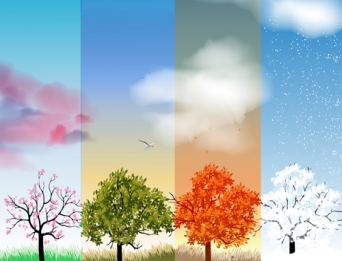 Winter is white,
Winter is white,
Springtime is green,
Summer is golden
And autumn’s a flame.
Four lovely seasons
To make up a year,
Sing them by colour
And sing them by name.
Seasons And Clothes
I like my school uniform. We wear it to school every day. It is purple and black. My favourite colour is yellow.
But I like to put on jeans and my blue jumper at home. I don’t like to wear skirts.
Children usually wear shorts and T-shirts in summer. When it’s cold we put on jackets or coats and warm trousers or skirts. Girls like wearing skirts and dresses in spring. My brother likes to wear his yellow jumper, blue jeans and white trainers.
What clothes do you wear?
My Favourite Raincoat Is Purple
My favourite raincoat is purple.
My favourite sweater is blue.
My favourite beautiful boots are black
My favourite sandals are, too.
My favourite raincoat is purple.
My favourite umbrella is, too.
My favourite beautiful boots are black
And my favourite blue jeans are blue.
My Summer Holidays
I like summer very much. It’s hot in summer. It’s sunny.
I have holidays in summer. I can swim in the river and fish in summer. I go to the forest and have a picnic. I play in the yard every day. I feed ducks and ride a bike in the park. The trees are green and the flowers are beautiful in summer.
I don’t go to school and I like it.
June brings tulips, lilies, roses,
Fills the children’s hands with posies.
Hot July brings apples and cherries,
And a lot of other berries.
August brings us golden corn,
Then the harvest home is born.
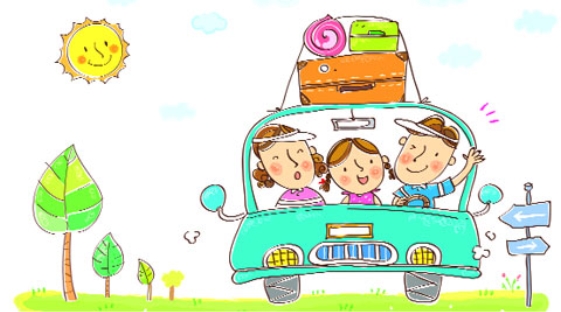
My Friend
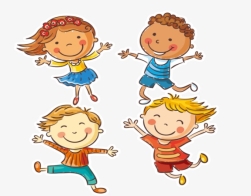 I have a friend. She is Olia. She is eight. Olia is a pupil. Olia lives in Bohun Street. My friend likes helping at home (playing tricks, doing her homework, reading books). She can play basketball. She can’t swim. Olia is kind ,happy ,clever and funny.
I have a friend. She is Olia. She is eight. Olia is a pupil. Olia lives in Bohun Street. My friend likes helping at home (playing tricks, doing her homework, reading books). She can play basketball. She can’t swim. Olia is kind ,happy ,clever and funny.
Olia is my best friend.
We play and learn together.
I like my friend.
Sports
I like sports. Children do sports every day. They play football, basketball, volleyball and tennis. Pupils do athletics and go swimming.
In winter we go skating and skiing.
In summer we go running and jumping.
I play tennis too. I am good at swimming. But I don’t like cycling. I can’t play basketball well.
Sports help children to keep strong. Do you do any sports?
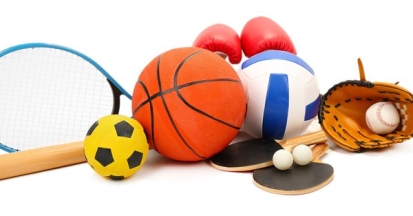
My Birthday
I like to celebrate different holidays. But my favourite one is my birthday ,of course.
My birthday is on the third of May. It’s a very happy and funny holiday. I usually have a party on my birthday. We invite many guests. They are my friends and relatives. We have a good time. We play different games, dance. sing songs and play tricks.
My Mum gives us tasty food:chicken legs, chips, ice cream, juice, etc.
My friends congratulate me. They give me fantastic presents:books and toys, flowers and sweets, colourful birthday cards and what not. And, of course, I have a big cake with candles in it.
My guests sing me “Happy Birthday!” It’s a great pleasure to be a birthday child.
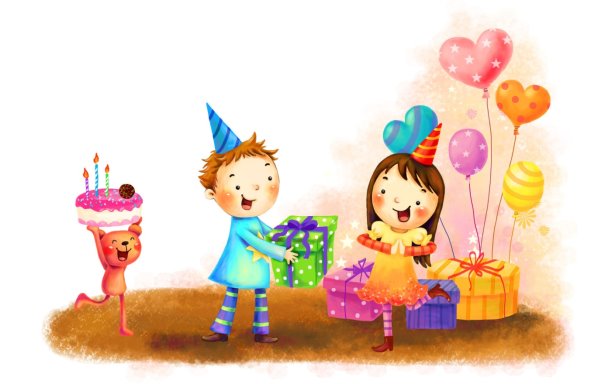
My Town
Hi! I am … . I live in Brody. My town is not very big but it’s nice. It’s old.
There are many streets in my town. They are wide. You can see many green parks and modern buildings in Brody.
We have four schools in Brody. I study at school №2.
There are many shops and 2 supermarkets in my town. We have a big hospital, a museum, a post office, a library and a cinema.
You can see many houses in my town. But we haven’t a swimming pool and a circus. It’s a pity!
I think my town is fantastic. I like it. You’re welcome to visit it.
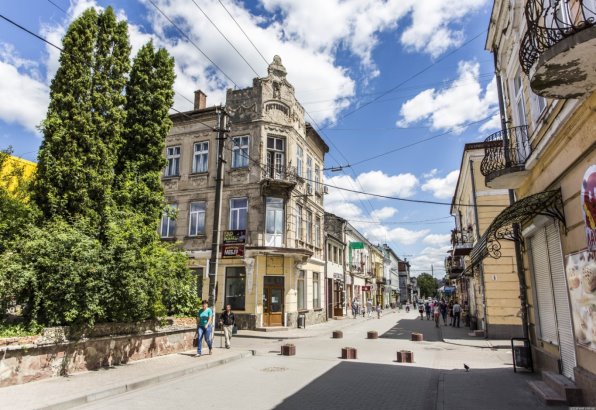
Traditions
We celebrate different holidays in my family:Easter, Christmas, New Year.
We celebrate New Year on the 31st of December. On that day we wish our dearest and nearest “Happy New Year” and drink a toast to the New Year.
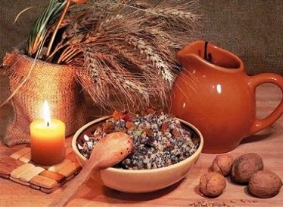 The 7th of January is Christmas Day.
The 7th of January is Christmas Day.
It’s a happy holiday for many people.
Jesus Christ was born on that day.
We gather at the Christmas table,
eat traditional food with our friends
and relatives.
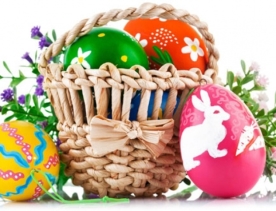
Easter is a beautiful holiday.
People celebrate it in spring.
Ukrainian people have their traditions.
They bring baskets with decorated eggs,
special baked bread-paska, cheese, ham,
sausage, salt and butter to the church for blessing.
Easter is a holiday of kindness and happiness.
The Earth
We live on the Earth. It is very, very big. There is a lot of water on the Earth. It is in the rivers, lakes, seas and oceans. There are many forests, fields, hills and mountains on it.
The Earth is full of wonders. Different animals live on the Earth. Different plants grow on it. The Earth is beautiful.
But our planet is in danger. People kill different animals. Why? Because they want to sell animals’ fur and tusks. People pollute rivers and forests. Different cars pollute air. People cut down trees.
We must save our planet. Don’t shoot the animals! Let’s clean forests and rivers.
Who Loves The Trees Best?
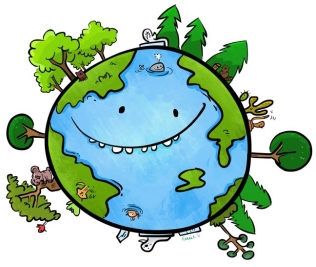 Who loves the trees best?
Who loves the trees best?
-I!-said the spring-
Green beautiful leaves
To them I bring
Who loves the trees best?
-I!-summer said
I give them flowers
White, pink and red.
Who loves the trees best?
-I!-autumn said-
I give them ripe fruit
Sweet and red.
Who loves the trees best?
-I love them best-
White winter answered
-I give them all rest.
Good Counsel For Children
Go to bed late,
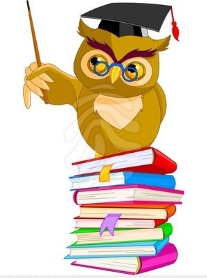 Stay very small,
Stay very small,
Go to bed early,
Grow very tall.
One thing at a time
And that done well,
Is a very good rule,
As many can tell.
Good ,better, best,
Never rest
Till “good” be “better”
And “better” “best”.
“Before Saying “Good-Bye”
Nod you head,
Bend you knees,
Grow as tall
As New Year trees.
On your knees
Slowly fall
Curl yourself
Into a ball.
Raise your head,
Jump up high,
Wave your hand
And say “Good-bye”.
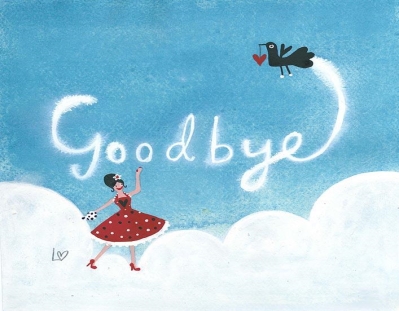
Висновок
Для розвитку навичок мовлення треба, щоб учні розмовляли якнайбільше і щоб їх мовлення в психологічному плані наближалось до природнього. А цього досягти якраз дуже важко, бо умови, що складаються в класі, не завжди стимулюють мовлення учнів на уроках. По-перше, учні весь час почувають обмеженість свого іншомовного словника, недостатнє володіння граматичними формами, і це стримує їх бажання говорити; по-друге, учням важко вийти за межі реальних навчальних ситуацій, в яких вони перебувають, і говорити на теми, нав’язані їм особливостями мовного матеріалу, який вони вивчають; по-третє, учнів сковує те, що форму і зміст їх висловлювань критично оцінюють учитель і товариші.
Щоб досягти ефективності навчання монологічного мовлення, потрібно створити всі необхідні для цього умови, зацікавити дітей, створити таку атмосферу, щоб діти не звертали увагу на перелічені вище недоліки.
Коли учні уже оволодіють первинними навичками монологічного мовлення, перед учителем розкриваються можливості використання численних прийомів розвитку навичок монологічного мовлення.
Під час засвоєння монологічних висловлювань основним завданням є розвиток в учнів здатності логічно і послідовно організовувати завершені повідомлення із структур, уже засвоєних у мовленні, а не відтворювати заучені тексти.
Навчання монологічного мовлення в шкільних умовах відбувається на тематичній основі. Теми визначають сферу, в межах якої учні оволодівають усною комунікацією, обсяг усної комунікації та її зміст.
Внутрішньою передумовою навчання монологічного мовлення є певний рівень розвитку гнучкості й натренованості психічних функцій особистості внаслідок попереднього досвіду монологічної діяльності рідною мовою є знання лінгвістичних особливостей монологічного мовлення, які повинен знати кожен вчитель.
Під час розробки системи вправ з навчання монологічного мовлення потрібно звертати увагу на рівень знань учнів, вікові та індивідуальні особливості учнів, враховувати психологічні особливості дітей та особливості їх пам’яті.
Список використаної літератури
1.Борисюк І. В. Роль тексту в розвитку мовлення учнів // Мовознавство. – 1998. – №1.
2.Ворожейкіна О. Вчимося монологічному мовленню // Українська мова та література. – 2005. – №13.
3.Плахотник В. М., Мартынова Р. Ю. Обучение английскому языку на начальном этапе в средней школе// Киев “Радянська школа” // 1990 //
4.Рогова Г. В., Верещагина И. Н. Методика обучения английскому языку на начальном этапе в средней школе// Москва “Просвещение”// 1988 //
5.Плахотник В. М., Мартынова Р. Ю. Обучение английскому языку на начальном этапе в средней школе// Киев “Радянська школа” // 1990 //
6.Рогова Г. В., Верещагина И. Н. Методика обучения английскому языку на начальном этапе в средней школе// Москва “Просвещение”// 1988 //
7. English World 2,3.Видавництво: MACMILLAN Publishers Limited 2009,Mary Bowen &Liz Hocking
1


про публікацію авторської розробки
Додати розробку
